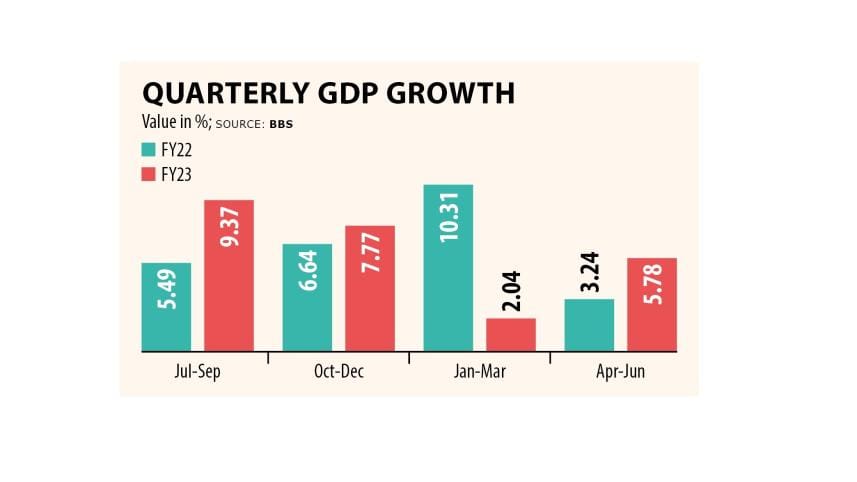GDP growth stands at 5.78% in Q4 of FY23

Bangladesh's economy slowed in fiscal 2022-23 although growth bounced back to 5.78 percent by the end of the year's fourth quarter, government data shows.
Despite the ongoing inflationary pressures brought on by the Russia-Ukraine war, the country registered strong economic growth of more than 9 percent in the first quarter of that year.
However, the expansion of its gross domestic product (GDP) slowed to about 7.77 percent in the second quarter before plunging to 2.04 percent in the third, shows data of the Bangladesh Bureau of Statistics (BBS).
As such, its average growth throughout the previous fiscal year was about 6.03 percent, as per a provisional estimate by the national statistical agency.
"The country's quarterly GDP growth mostly varies for domestic and global factors," said Khondaker Golam Moazzem, research director of the Centre for Policy Dialogue (CPD), an independent think-tank.
"Besides, the economy's indicators are too inconsistent," he added, citing how seasonal changes affect productivity in the agriculture sector.
But on a yearly basis, the country witnessed almost double growth in the April-June period of FY23 thanks to higher industrial output despite contractions in the agriculture and service sectors.
Growth in the industrial sector, which accounts for around 33 percent of the GDP, jumped to about 11.89 percent in the last quarter of FY23 while it was 1.74 percent during the same period a year prior.
But growth in the services sector, which makes up 53 percent of the GDP, contracted to 3.07 percent in April-June quarter of FY23 from 4.76 a year earlier.
Similarly, growth in the agriculture sector slowed to 0.36 percent from 2.53 percent at the same time.
However, growth in the construction sector leaped to 10.09 percent in April-June after registering negative growth during the same period of fiscal 2021-22.
Likewise, the manufacturing sector saw 13.57 percent growth, which was the highest among all sub-sectors.
Moazzem said the country's economic growth has been fluctuating from quarter to quarter due to higher inflation and raw material costs resulting from crises at home and abroad.
He welcomed the BBS's initiative to publish quarterly GDP data to meet conditions laid out by the International Monetary Fund for securing a $4.7 billion concessional loan.
In the past, there was doubt about the reliability of the BBS's data on GDP. But now, the BBS's initiative will help reduce variations among the estimates by development partners, Moazzem added.




 For all latest news, follow The Daily Star's Google News channel.
For all latest news, follow The Daily Star's Google News channel.
Comments